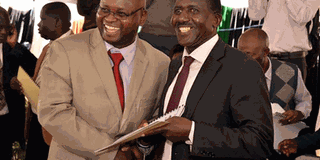Nurses union calls off strike, signs pact with governors

KNUN General-Secretary Seth Panyako (left) exchanges documents with Nandi Governor Cleophas Lagat at Delta House, Nairobi, on December 14, 2016. PHOTO | FRANCIS NDERITU | NATION MEDIA GROUP.
What you need to know:
The negotiations on the nurses four-year Collective Bargaining Agreement will begin in January 2017 and will stretch until no further than March 2017.
The recognition agreement specifies that the nurses in Job Group M and above will earn Sh15,000 “special allowances” while those in Job Group G to L will receive Sh20,000 every month
The documents were signed by a number of people: Health Cabinet Secretary Cleopa Mailu, Kisumu Governor Jack Ranguma (Health chair, Council of Governors), Kisii Governor James Ongwae (Human resources point person, Council of Governors), Kenya National Union of Nurses secretary-general Seth Panyako and chairperson John Biiy.
Nurses’ union officials have called off their national strike after governors signed to recognise their Collective Bargaining Agreement, a decision that has earned the caregivers of up to Sh20,000 monthly allowances.
Negotiations on the nurses four-year CBA will begin in January 2017 and will stretch until no further than March 2017.
The recognition agreement specifies that nurses in Job Group M and above will earn Sh15,000 in special allowances while those in Job Group G to L will receive Sh20,000 every month
The documents were signed by Health Cabinet Secretary Cleopa Mailu, Kisumu Governor Jack Ranguma (Health chair, Council of Governors), Kisii Governor James Ongwae (Human resources point person, Council of Governors), Kenya National Union of Nurses Secretary-General Seth Panyako and Chairperson John Biiy.
WITHDRAW CASE
The two parties agreed that county governments would not punish or intimidate any of the officials for participating in the job boycott that claimed dozens of lives.
The Council of Governors will also withdraw the case county bosses had lodged against the union officials.
Recognising the critical role that caregivers play in Kenya, Dr Mailu thanked the nurses for operating in a spirit of empathy and agreeing to go back to work.
According to the Nursing Council of Kenya data quoted in the 2016 economic survey, there were 73,562 nurses in Kenya in 2015, the bulk (46,038) being graduate and higher diploma holders, also referred to as registered nurses.
There are nearly another 6,000 that were in training in 2015 and are expected to join service in the near future.
9:100,000 RATIO
There are nine nurses per 10,000 patients, way below World Health Organisation recommended 23 per 10,000 patients.
These nurses' new allowances alone will cost taxpayers approximately a maximum of Sh1.5 billion every month.
The document clarifies that the monies would be paid in two instalments: the first tranche will be 60 per cent and the remaining 40 per cent will be paid in July in 2017.
While the public can sigh in relief that the job boycott that had paralysed service delivery in public hospitals is finally over, questions in the medical fraternity abound on what the nurses were really striking for.
DELAYED
An official who participated in the negotiations said the union officials called for a strike hoping to ride on the doctors’ job boycott when they had not agreed unanimously on their demands.
The signing of the recognition agreement in Delta House in Nairobi was delayed and at one point an angry Seth Panyako—the union’s vocal secretary-general— drove off, saying that the governors were seeking to turn them into “marionettes”
Mr Panyako told Nation.co.ke: “they want us to call of the strike before signing, and we have no assurance that they will keep their word”.
In the two hours that were whiled away, events that pointed to disagreements in the union played out.
Two days ago, the union was split after a section of its officials agreed to call off the strike to the chagrin of Mr Panyako who he is the one mandated by Knun constitution to call of the job boycott.
CLEAR POLICY
Amid the Wednesday delays, two former officials, a Mr Kibiriti and a Jeremiah Maina, tried to address the press before they were dismissed and whisked away as “impostors and traitors”.
Be that as it may, the CBA should address pertinent issues that nurses have been raising for years: there is not a clear policy on how they should be promoted; there are other human resources concerns such as medical insurance; and they have had many employers-- from the defunct local authorities and now county and national governments.
These multiple sources of employment have seen nurses in lower job groups earning more than their counterparts in higher grades.





